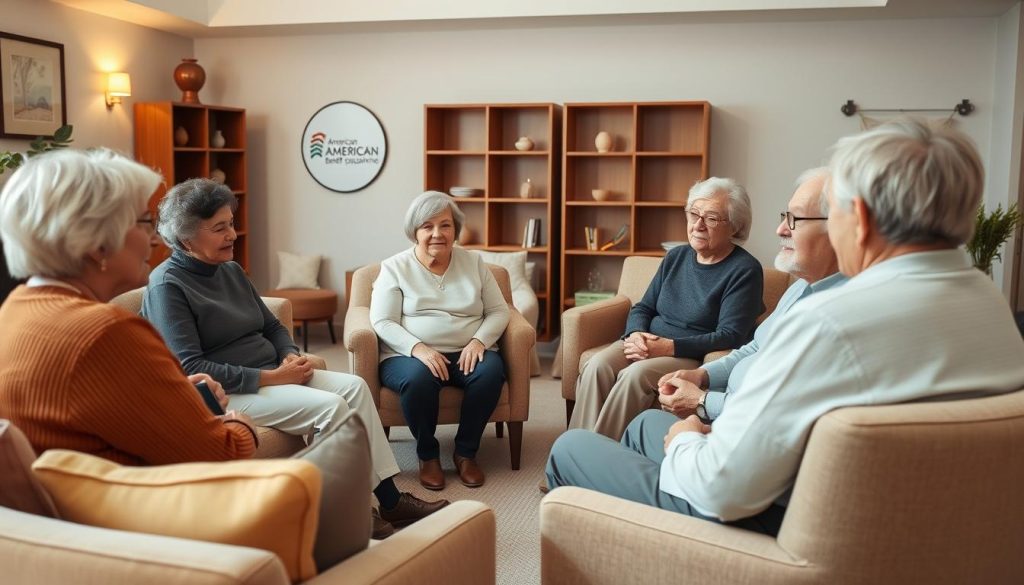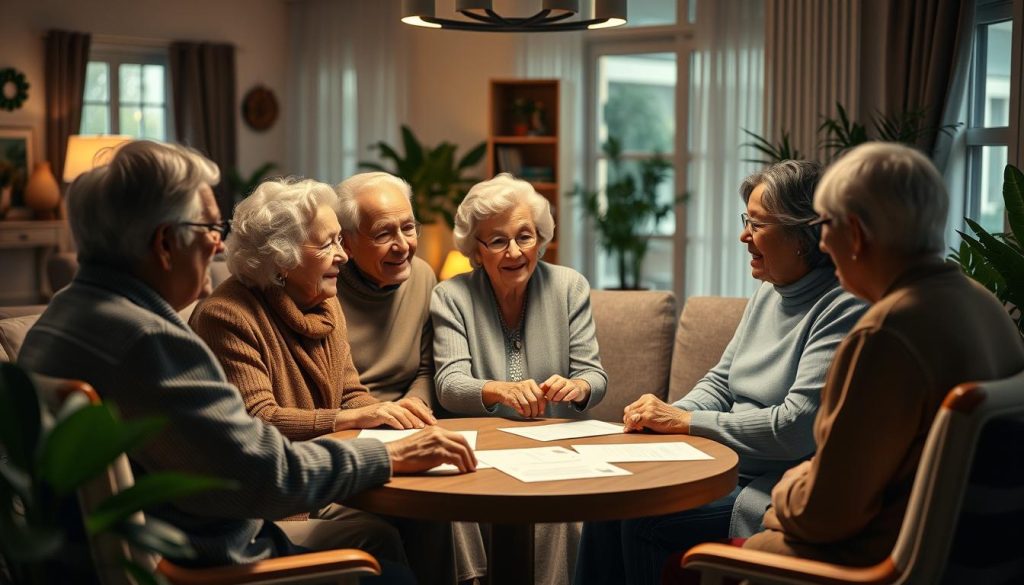Did you know family fights with seniors often start due to misunderstanding, not disagreement? In the U.S., the elder population is set to double between 2008 and 2030. Many baby boomers will turn 65 during this time. This makes family situations more complex1. We need smart ways to solve these family issues with seniors. This guide gives you helpful tips on dealing with elder care conflicts. It helps make sure kindness and clear understanding are at the heart of all talks.
Key Takeaways
- The elder population is set to double, highlighting the need for effective conflict resolution strategies.
- Understanding the root causes of family disputes with seniors is crucial for peaceful resolutions.
- Effective communication techniques can significantly ease tensions in elder care conflicts.
- Mediation offers a viable solution for high conflict cases involving elders.
- Recognizing signs of conflict early can help in managing disputes before they escalate.
- Utilizing emotional intelligence and active listening is key in addressing elder conflicts.
Understanding Elder Conflict Resolution
Elder conflict resolution deals with solving disputes involving older adults. It’s important because it addresses unique challenges. These include emotional issues and legal matters affecting families and professionals. Often, conflicts come from not understanding needs or poor communication. This can hurt relationships. Good mediation helps solve these issues peacefully, instead of making them worse.
Research shows common elder care problems include health decisions, money worries, and communication barriers2. These issues can cause big family disputes. Emotional stress makes conflicts bigger. It’s important for caregivers and families to work on solving these problems together. This way, they can find solutions that honor the elder’s wishes and keep the family close.
The mediation process helps everyone involved have a say in the outcome. This is better than letting a court decide. Mediation often takes about two hours. This is much faster than going to court, which can take a lot of time and money3. Elder law mediators are specially trained to help with these situations. They understand both mediation and issues older people face3.
At its core, elder conflict resolution is about more than fixing disagreements. It aims to make life better, improve family ties, and respect the elder’s choices. Using effective mediation helps families deal with problems in a structured way. This leads to friendly solutions that put the elder’s needs first4.
The Importance of Addressing Family Disputes with Seniors
Finding solutions to family problems with seniors is very important. It keeps relationships strong and ensures seniors get the help they need. When elder care fights are ignored, everyone gets more stressed. This makes caring for aging loved ones even harder. Studies show many families fight about their senior members’ health care, housing, and money decisions5. These fights can hurt the senior’s health and happiness. That’s why it’s so important to solve these problems early.
Dealing with these issues early helps keep families together. It shows respect and honor to seniors. But often, adult children wait too long to talk about their aging parents. They wait until there’s an emergency5. Waiting too long can make fights worse and cause hard feelings among brothers and sisters.
Talking more can help families work better together. This is especially true when making big decisions for the senior’s future. Starting to solve problems early is a good idea. Mediation is a way to help with money, legal, and health choices6. It helps everyone work as a team. This avoids making things a big court fight, which can cost a lot of feelings and money6.
Working out these problems is good for keeping the family together. It also protects the senior’s rights. Not solving these fights might lead to using courts. Mediation is a better choice. It makes sure everyone talks and understands each other. This helps to sort out any confusion about helping care for the senior. Saying “thank you” to each other for helping can make everyone feel better. It leads to better talks later and less chance of feeling upset or tired7.
| Benefits of Addressing Family Disputes | Consequences of Ignoring Conflicts |
|---|---|
| Improved communication and collaboration | Heightened family stress levels |
| Increased elder health and well-being | Deterioration of relationships |
| Preservation of family unity | Legal battles and disputes |
| Enhanced dignity and rights for elders | Long-term emotional strain |
Working together on senior family problems is key. It helps everyone. This way, elder care issues get solved better and faster567.
Key Strategies for Managing Conflicts in Elder Care
Managing conflicts in elder care is very important. It helps keep both caregivers and the elderly happy. By knowing what causes conflicts, caregivers can plan ahead. This helps avoid fights and makes families get along better. Talking and listening well are key.
Understanding the Root Causes of Conflicts
Conflicts come from not understanding each other, having different values, or stress from caregiving. A study by Stum in 2007 showed that couples worry about paying for long-term care. This worry leads to many arguments8. Another study in 2012 by Barnett & Stum found that families fight about money for elder care8. Money problems make things harder, so it’s important to plan how to spend for care9. Gwyther in 1995 said fights about what care is needed can make tensions worse8.
Effective Communication Techniques
To solve elder care fights, good communication is needed. Listening well, being kind, and staying calm helps a lot. A social worker or counselor can fix caregiving fights between brothers and sisters9. Talking about who does what and money matters can stop future fights9.
| Conflict Cause | Effective Strategy |
|---|---|
| Financial stress | Develop a family budget and roles |
| Misunderstandings between siblings | Engage in open discussions and seek mediation |
| Emotional strain | Utilize professional counseling services |
Knowing about conflicts in elder care is the start of making things better. It leads to good relationships and better care8.
Mediation for Elderly Disputes: A Viable Solution
Mediation helps families looking after seniors to solve conflicts. It takes place in a neutral setting. This lets family members talk things out and find solutions. Mediating not only resolves arguments but also creates lasting fixes. These fixes come from the family, making everyone feel involved in the outcome.
Benefits of Mediation for Elder Conflicts
Mediation offers many perks. Families get to resolve money problems, like who gets power of attorney or selling a house. This leads to agreements that make everyone happy10.
It’s also cheaper than going to court, saving money and stress10. Mediation helps talk about money matters in a clear way. This is helpful when choosing where the elder will live. Usually, mediation works fast, better than long family therapy sessions11.
Choosing the Right Mediator for Elder Care Issues
Picking a good mediator is key. Look for their credentials and experience with elder issues. Also, check if they’re in groups like the Academy of Professional Family Mediators (APFM)11. Ask about their training to make sure they can guide talks well. It’s important for everyone to agree to join the mediation. This helps keep family ties strong12.

Recognizing Signs of Conflict in Senior Living
In senior living, spotting conflict signs early is key. Issues often come from shared areas or different likes. Misunderstandings can mess up peace too. Spotting these early helps keep life good for seniors>.
Look out for hints of trouble. Like if talking changes, or if there’s more emotional outbursts. Families should know, differing views on care can cause conflicts>. Knowing these signs helps families act early to solve problems.
It’s important for everyone to talk openly. This makes less mix-ups and problems>. Staff who know what to look for can help fix things early. They help make a happy place to live.
Being proactive strengthens bonds. When everyone helps decide, it builds community. It also ensures good choices are made>13>. Understanding and working together reduces conflicts, which is good for all.
Conflict Resolution Strategies for Older Adults
Good conflict resolution methods can really help older people when they disagree. It’s key to know how to handle these tough moments with care. They need to be patient and learn about emotional smarts. This knowledge helps them understand their own feelings and others’. It leads to better talks.
Developing Emotional Intelligence
Gaining emotional smarts matters a lot for seniors. It helps them handle their feelings better. One tip is to stop and think before reacting14. Simple steps like counting to ten or taking a deep breath are useful. They give time to think clearly before speaking14. Being open and honest with family strengthens trust. It stops confusion before it starts14.
Utilizing Active Listening Skills
Listening well is key to cutting down fights for elders. Sometimes, what seems like ignoring is actually a hearing problem14. Setting specific times to talk can help avoid issues. This works well in the afternoons to keep the peace14. Harvard Law School experts say making threats only makes things worse. It’s because people react badly to them and may fight back15.
Handling Family Conflicts Involving Seniors
Dealing with family conflicts involving seniors needs care and kindness. Families often face challenges like uneven caregiving roles, money fights, and different care wishes. These can cause disputes where feelings are strong and talking stops. It shows why we need good ways to solve these conflicts.
Talking openly is key to fixing conflicts. Families should put the senior’s needs first and include them in talks. This builds respect and understanding, leading to decisions made together. Geriatric care managers can help by offering impartial views and figuring out what seniors need for proper care services16.
Family mediators are important for calming family arguments. They listen to everyone alone and then bring them together for talks, often by video call17. This way helps manage feelings well, reducing confusion and sudden anger.
Old family problems often come back during caregiving, adding stress18. When these feelings emerge, using good communication helps everyone get along. If things get tough, mediators can help families make big decisions about a parent’s care and where they live17.
Families should get help when they need it. Groups in the community sometimes offer elder care mediation for a lower price. This can help those with less money17. By understanding how to handle conflicts with seniors, families can find good solutions that make sure the elder’s well-being is always the main thing.
| Conflict Source | Details |
|---|---|
| Unequal Responsibilities | Perceived imbalances among siblings can intensify conflicts. |
| Financial Disagreements | Contentions about financial resources affect family dynamics. |
| Differing Care Preferences | Contrasting views on care can lead to disputes. |
| Past Family Conflicts | Unresolved tensions emerge during caregiving. |
| Decision-Making Struggles | Disputes occur around medical and legal decisions. |
| Coping with Emotional Stress | Caregiving’s emotional toll strains relationships. |
| Communication Breakdown | Misunderstandings escalate conflicts among siblings. |
| Competing Interests | Balancing personal commitments complicates caregiving responsibilities. |
| Parental Favors | Perceived favoritism causes family tension and resentment. |
Eldercaring Coordination: A Structured Approach
Eldercaring coordination helps solve conflicts in elder care. It looks at emotions and practical problems in family fights. Families learn to talk and solve problems well, honoring good elder care ethics.
Guidelines for Eldercaring Coordination
For eldercaring coordination, we follow rules that help elders stay safe and happy. These rules include:
- Letting elders help decide things for their health and happiness19.
- Choosing eldercaring coordinators to help for up to two years. They bring support and good talking19..
- Giving coordinators training to fix fights while keeping elders safe and free19.
Ethics and Best Practices in Eldercaring Coordination
Eldercaring coordination is all about being ethical. The best ways help respect elders and reduce family stress. Coordinators guide families to resources and protect elders from harm. This helps families heal and get along better20.

Over 130 cases have seen good results from this plan. It works well in tough fights and helps care for elders the right way20. Families talk and make decisions better, helping their loved ones grow old gracefully.
Elder Conflict Resolution: Best Practices for Peaceful Resolutions
Using best practices for elder conflict resolution helps achieve peaceful resolutions for elder disagreements. Families face challenges needing smart care solutions. Mediation and clear talk help avoid conflicts.
Conflict resolution is about finding a fair solution. It aims to improve relationships and find quick, helpful outcomes21. Knowing issues, talking well, and thinking of solutions are key. This approach leads to agreements good for all21.
Understanding emotions is also key. Training helps families handle disagreements with care and teamwork22. Seeing signs of upset and being gentle helps keep care effective.
Practicing resolution skills makes family talks better. Use humor, talk it out, or try mediation if needed. Role-play or mindfulness can prepare for future problems23. Open talks maintain respect and solve issues well.
Real-life Examples of Successful Conflict Resolution
Seeing elder conflict resolution in real life teaches us a lot. Families often face problems due to different ways of working and talking. This can cause misunderstandings and make people feel upset. In elder care, these issues show up when families and caregivers don’t understand each other. Just like at work, talking better can solve these problems. Many case studies show how important talking is.
A family couldn’t agree on their elderly parent’s care plan. They weren’t clear or respectful of each other’s views. Using mediation helped everyone talk openly. They shared their worries and needs. This story shows how elder care can be improved with good planning. Mediation made sure everyone’s wishes were respected, especially the elderly’s.
In some studies, using a talking stick helped people talk nicely and listen during tough talks. This can work well in elder care too. It makes sure everyone can share their thoughts without being interrupted. This method helps solve fights just like it does in government talks24..
Real stories from elder care show us that good talks help solve fights. When companies use good mediation, they solve big problems like job discrimination. This is because it stops bad feelings from growing25. It’s the same in elder care. Everyone works better together. Good talks and mediation make a place where everyone gets along well. This helps solve problems in caring for the elderly.
Conclusion
Solving elder conflicts well is key to happy family life and better living for seniors. This guide has shown ways to settle disputes, stressing good talk and conflict handling methods. These steps help build understanding and make elders feel valued and loved.
Using mediation and eldercaring helps families deal with tough conflicts in smarter ways. We saw that specific solutions work best for hard situations. Having a clear plan for solving problems, plus kindness and understanding in the family, leads to good results. This shows the best care for elders.
In wrapping up our talk on elder conflict solving, remember it’s our job to find peaceful solutions. Taking up these methods not only helps seniors but also strengthens family bonds and love262728.
Source Links
- Communication, Negotiation and Conflict Resolution for Elders and Caregivers – EZ Elder Law
- Elder Mediation in Theory and Practice: Study Results From a National Caregiver Mediation Demonstration Project
- How Elder Law Mediation Can Help to Resolve Conflicts and Care for Aging Parents | Dillman & Owen Estate & Elder Law
- Family Conflicts over Elderly Parents | Seniors Guide
- Elder and Family Mediation
- How to Address Family Conflicts Concerning Caregiving for Aging Parents
- How to support aging parents and address potential conflicts
- Siblings Fighting Over Elderly Parents: Problems and Solutions
- Elder and Family Mediation Services
- Elder Care Mediation Eases Family Conflict While Caring for Senior Parents
- Elder mediation is family mediation, too
- Conflict Resolution in Assisted Living Facilities
- Conflict Resolution Tips for You and Your Elderly Loved One – Rivers of Hope
- 5 Conflict Resolution Strategies
- How to Handle Family Conflicts Regarding an Aging Parent’s Care
- Navigating Elder Care Conflicts: How Family Mediators Can Help – Von Rock Law
- Dealing With Family Conflict For Elderly Parents and Assisted LIving
- Chapter 20. Providing Information and Enhancing Skills | Section 6. Training for Conflict Resolution | Main Section
- Five Conflict-Resolution Strategies for the Workplace
- Conflict Resolution: Definition, Benefits, and Techniques
- Conflict Resolution Success Stories: A Surprising Tale from Congress
- 5 Real-Life Examples of Workplace Conflict (with Resolutions) | AllWin Conflict Resolution Training
- Resolving Conflict Biblically | Tabletalk
- When Elders Disagree: A Pathway for Pastoral Conflicts
- Microsoft Word – ILJ-V29-2-Gross_BP.docx

Leave a Reply